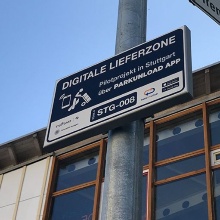How can delivery traffic in densely populated cities be organized in a smart and sustainable way? In the final report of the joint project “Smart Zone Stuttgart”, commissioned by the state capital Stuttgart, Fraunhofer IAO, the cooperating Institute of Human Factors and Technology Management (IAT) of the University of Stuttgart, and ParkUnload show what digital delivery zone management in the state capital can look like and how urban logistics data can be used in a sensible way.
In order to improve delivery zone management in the densely populated and busy state capital of Stuttgart, the Fraunhofer Institute for Industrial Engineering (IAO), together with the cooperating Institute of Human Factors and Technology Management (IAT) at the University of Stuttgart and the Spanish technology and platform provider ParkUnload SL, launched Germany’s first pilot project on the topic of digital delivery zones on behalf of the state capital of Stuttgart in November 2020. The goal of the “Smart Zone Stuttgart” project was to pilot an approach to collecting and controlling commercial traffic data in real time using digital technologies in order to enable the intelligent management of delivery traffic in the city. The project was funded by the German Federal Ministry for Digital and Transport (BMDV) as part of the Clean Air immediate action program.
The digitally supported delivery zone management is based on the use of a smart phone app combined with sensor-based signs. With the newly introduced app, delivery service providers such as Hermes, DHL, DPD, and UPS were given the opportunity to check the availability of free delivery zones in real time. The app enabled a direct approach to the free delivery zones. When the delivery zone was reached, it was marked as occupied for others in the app via Bluetooth. The delivery person was thus able to use the area for loading and unloading. In the final project report, the research team shares its findings, which have been scientifically evaluated, and provides recommendations for action.
Digitalization of public delivery areas requires overarching collaboration
With the findings from the pilot project, a decisive contribution to the digitalization of municipal transport systems was made. By testing a new technology for delivery traffic in the public street space, the acceptance of such an app was confirmed among the participating delivering companies. The results of the pilot project also show that there is definitely potential for digitalized delivery zones or a generally digitalized occupancy display in the street space. But in order for this to be successfully implemented, cities should provide the relevant real-time data on road space usage so that app providers and other technology developers can build on it. “We have determined that further research should increasingly be focused on the collection, processing and, in particular, provision of data by local authorities. Here, municipalities need timely consultation on possible digital solutions, data analysis tools, and platforms. It is not the task of municipalities to provide the final technologies. Instead, municipalities should be setting the appropriate framework conditions,” say Rebecca Litauer of Fraunhofer IAO and Rudolf Fischer of the IAT.
The state capital Stuttgart plans to analyze the situation of the delivery zones in 2022 as part of the concept for a “livable city center for all” with an in-depth study and to examine technological options in order to be able to organize and better coordinate delivery processes in the city center in a more sustainable and demand-oriented manner. These ideas and considerations can then be integrated into a city-wide city logistics concept for the state capital.
Expert Contact:
Rudolf Fischer, University of Stuttgart, Institute of Human Factors and Technology Management (IAT), Urban Systems Engineering Research Unit, Tel. 0711 970-5312, E-Mail


